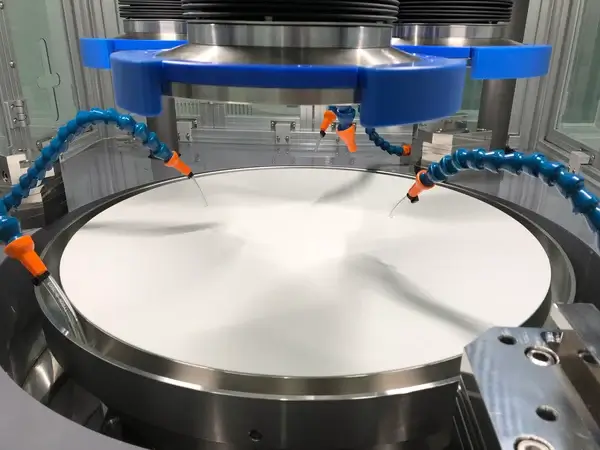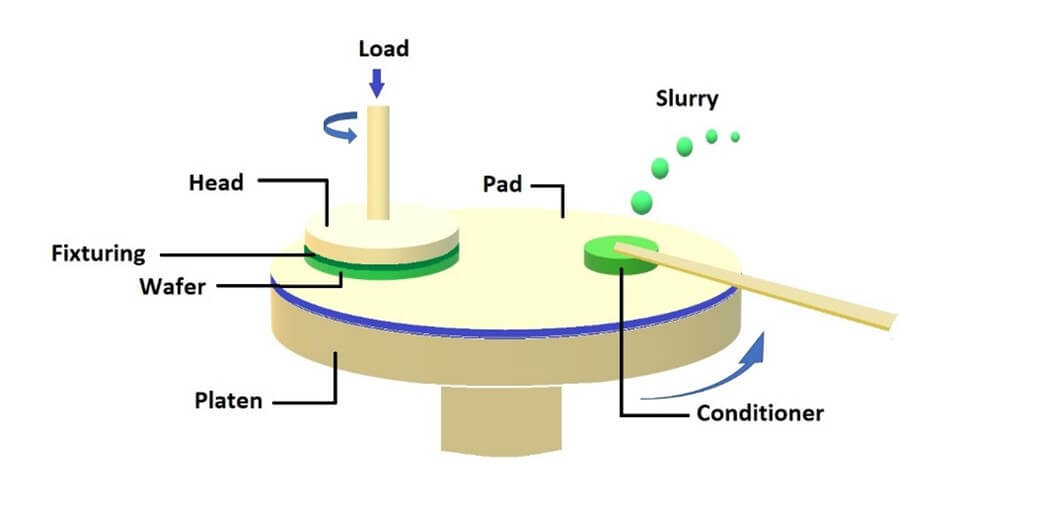The chemical-mechanical polishing (CMP) is often involved with producing smooth surfaces by chemical reaction, especially works in the industry of semiconductor manufacturing. Lonnmeter, a trusted innovator with over 20 years of expertise in inline concentration measurement, offers state-of-the-art non-nuclear density meters and viscosity sensors to address the challenges of slurry management.

The Importance of Slurry Quality and Lonnmeter’s Expertise
The chemical mechanical polishing slurry is the backbone of the CMP process, determining the uniformity and quality of surfaces. Inconsistent slurry density or viscosity can lead to defects like micro-scratches, uneven material removal, or pad clogging, compromising wafer quality and increasing production costs. Lonnmeter, a global leader in industrial measurement solutions, specializes in inline slurry measurement to ensure optimal slurry performance. With a proven track record of delivering reliable, high-precision sensors, Lonnmeter has partnered with leading semiconductor manufacturers to enhance process control and efficiency. Their non-nuclear slurry density meters and viscosity sensors provide real-time data, enabling precise adjustments to maintain slurry consistency and meet the stringent demands of modern semiconductor manufacturing.
Over two decades of experience in inline concentration measurement, trusted by top semiconductor firms. Lonnmeter’s sensors are designed for seamless integration and zero maintenance, reducing operational costs.Tailored solutions to meet specific process needs, ensuring high wafer yields and compliance.
The Role of Chemical Mechanical Polishing in Semiconductor Manufacturing
Chemical mechanical polishing (CMP), also referred to as chemical-mechanical planarization, is a cornerstone of semiconductor manufacturing, enabling the creation of flat, defect-free surfaces for advanced chip production. By combining chemical etching with mechanical abrasion, the CMP process ensures the precision required for multi-layered integrated circuits at nodes below 10nm. The chemical mechanical polishing slurry, composed of water, chemical reagents, and abrasive particles, interacts with the polishing pad and wafer to remove material uniformly. As semiconductor designs evolve, the CMP process faces increasing complexity, requiring tight control over slurry properties to prevent defects and achieve the smooth, polished wafers demanded by Semiconductor Foundries and Materials Suppliers.
The process is essential for producing 5nm and 3nm chips with minimal defects, which ensures flat surfaces for accurate deposition of subsequent layers. Even minor slurry inconsistencies can lead to costly rework or yield loss.

Challenges in Monitoring Slurry Properties
Maintaining consistent slurry density and viscosity in the chemical mechanical polishing process is fraught with challenges. Slurry properties can vary due to factors such as transport, dilution with water or hydrogen peroxide, inadequate mixing, or chemical degradation. For instance, particle settling in slurry totes can cause higher density at the bottom, leading to non-uniform polishing. Traditional monitoring methods like pH, oxidation-reduction potential (ORP), or conductivity are often inadequate, as they fail to detect subtle changes in slurry composition. These limitations can result in defects, reduced removal rates, and increased consumable costs, posing significant risks for semiconductor equipment manufacturers and CMP services providers. Compositional changes during handling and dispensing affect performance. Sub-10nm nodes require tighter control over slurry purity and blend accuracy. pH and ORP show minimal variation, while conductivity varies with slurry aging. Inconsistent slurry properties can increase defect rates by up to 20%, per industry studies.
Lonnmeter’s Inline Sensors for Real-Time Monitoring
Lonnmeter addresses these challenges with its advanced non-nuclear slurry density meters and viscosity sensors, including viscosity meter inline for in-line viscosity measurements and the ultrasonic density meter for simultaneous slurry density and viscosity monitoring. These sensors are designed for seamless integration into CMP processes, featuring industry-standard connections. Lonnmeter’s solutions offer long-term reliability and low maintenance for its robust construction. Real-time data enables operators to fine-tune slurry blends, prevent defects, and optimize polishing performance, making these tools indispensable for Analysis and Testing Equipment Suppliers and CMP Consumables Suppliers.
Benefits of Continuous Monitoring for CMP Optimization
Continuous monitoring with Lonnmeter’s inline sensors transforms the chemical mechanical polishing process by delivering actionable insights and significant cost savings. Real-time slurry density measurement and viscosity monitoring reduce defects like scratches or over-polishing by up to 20%, according to industry benchmarks. Integration with PLC system enables automated dosing and process control, ensuring slurry properties stay within optimal ranges. This leads to a 15-25% reduction in consumable costs, minimized downtime, and improved wafer uniformity. For Semiconductor Foundries and CMP Services Providers, these benefits translate to enhanced productivity, higher profit margins, and compliance with standards like ISO 6976.
Common Questions About Slurry Monitoring in CMPWhy is slurry density measurement essential for CMP?
Slurry density measurement ensures uniform particle distribution and blend consistency, preventing defects and optimizing removal rates in the chemical mechanical polishing process. It supports high-quality wafer production and compliance with industry standards.
How does viscosity monitoring enhance CMP efficiency?
Viscosity monitoring maintains consistent slurry flow, preventing issues like pad clogging or uneven polishing. Lonnmeter’s inline sensors provide real-time data to optimize the CMP process and improve wafer yields.
What makes Lonnmeter’s non-nuclear slurry density meters unique?
Lonnmeter’s non-nuclear slurry density meters offer simultaneous density and viscosity measurements with high accuracy and zero maintenance. Their robust design ensures reliability in demanding CMP process environments.
Real-time slurry density measurement and viscosity monitoring are critical for optimizing the chemical mechanical polishing process in semiconductor manufacturing. Lonnmeter’s non-nuclear slurry density meters and viscosity sensors provide Semiconductor Equipment Manufacturers, CMP Consumables Suppliers, and Semiconductor Foundries with the tools to overcome slurry management challenges, reduce defects, and lower costs. By delivering precise, real-time data, these solutions enhance process efficiency, ensure compliance, and drive profitability in the competitive CMP market. Visit Lonnmeter’s website or contact their team today to discover how Lonnmeter can transform your chemical mechanical polishing operations.
Media Contact
Company Name: SHENZHEN LONNMETER GROUP
Email: Send Email
Country: China
Website: https://www.lonnmeter.com/
